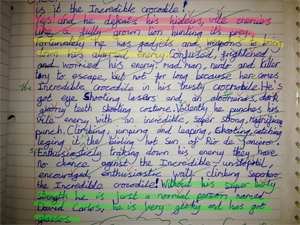
For the past 5/6 years, my school has been using Big Writing in literacy to provide a focused time for children to write. As time has passed we have moulded our approach to include other useful aspects of literacy. We now tend to use our Big Writing session as a final piece to a particular text type focus, unless it is an assessed piece and has to be a standalone lesson. Often we use a Big Writing lesson at the start of a text type to assess what the children already know or can remember from previous years. This is a great way of informing future planning. For example, if you were covering 'Instructions' and few children used imperative verbs, this would inform you to focus on this in your planning.
After a year or so of using Big Writing, I started to think about the whole writing process. It was advised that during the next Big Writing session children should be given time to read back on their work, look at the comments and, as a class, decide on some “goal scorers.” This is a good way of revising, but I felt it wasn't enough; also, if it was a whole week or two later, the activity is long forgotten by the children. I am sure if you ask any author they will always say that the revising and editing part of writing is possibly the most important. But how can we teach this and instil a reflective approach in children? Timed writing sessions don’t provide this quality time to reflect on your writing. It led me to make a resource which I have found invaluable ever since.

A community-driven platform for showcasing the latest innovations and voices in schools
Pioneer House
North Road
Ellesmere Port
CH65 1AD
United Kingdom